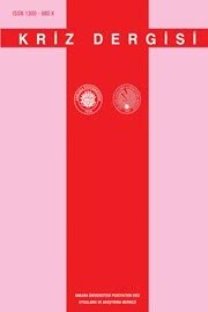DSM’ler boyunca travma kavramının seyri
Literatürde ‘A ölçütü sorunu’ olarak geçen Travma Sonrası Stres Bozukluğu’nun (TSSB) ‘travma’yı tanımlayan ilk ölçütünün içeriği Ruhsal Bozuklukların Tanısal ve Sayımsal El Kitabının (DSM) üçüncü baskısında bu yana tartışılmakta ve her yeni DSM sürümüyle de değişikliğe uğramaktadır. DSM’nin üçüncü baskısından önce de travma ile ilişkili bozukluklardan bahsedilmiş olmakla beraber hem travmanın hem travma ile ilgili bozuklukların doğrudan tanımı yapılmamıştır. TSSB tanısında travma tartışmalı tek yönlü bir nedenselliğe işaret etse de merkezi önemini korumaya devam etmektedir. Bu makalede travmanın DSM sürecinde geçirdiği değişim incelenmiştir
Anahtar Kelimeler:
Post travmatik stres
The Course of The Trauma Concept Throughout the DSMs
The ‘Criterion A problem’ has been a topic of debate since the introduction of PTSD in DSM-III and the definition of trauma has changed in every new DSM edition. Many psychiatric disorders were already accepted to be related to traumatic life events, thus the authors of DSM-I and II did not specifically identify a distinct category of traumatic disorders. The controversery also stems from etiological causality: wordings such as ‘trauma related’ or ‘traumatic’ generally refer to a definite causality in general medicine as well as psychiatry. İn this article we will focus on the change of the concept of trauma in DSM process from first edition to last edition planned for publication in 2013
Keywords:
Post Traumatic Stress,
___
- American Psychiatric Association. (1952). Diagnostic and statistical manual of mental disorders, DSM-I. Washington, DC. (1. edition)
- American Psychiatric Association. (1966). Diagnostic and statistical manual of mental disorders, DSM-II. Washington, DC.(2. edition)
- American Psychiatric Association. (1980). Diagnostic and statistical manual of mental disorders, DSM-III. Washington, DC.(3.edition)
- American Psychiatric Association. (1987). Diagnostic and statistical manual of mental disorders, DSM-III. Washington, DC.(3.edition revised)
- American Psychiatric Association. (1994). Diagnostic and statistical manual of mental disorders, DSM-IV. Washington, DC(4. edition)
- American Psychiatric Association. (2000). Diagnostic and statistical manual of mental disorders, DSM-IV. Washington, DC(4. edition revised)
- American Psychiatric Association DSM-5 Task Force (2010) www.dsm5.org. Washington DC: American PsychiatricAssociation.
- Avina,C. & O’Donohue,W. (2002) Sexual harassment and PTSD: is sexual harassment diagnosable trauma? Journal of Traumatic Stress, 15; 69-75.
- Gerson B. (1992) Post-traumatic Stress Disorder: The History of a Recent Concept British Journal of Psychiatry 161;742-748
- Jones, E & Wessely, S (2005). Shell shock to PTSD, military psychiatry from 1900 to the Gulf war. Hove: Psychology Press.
- Jones E,(2007) A Paradigm shift in the conceptualization of psychological trauma in the 20th century. Journal of Anxiety Disorders 21:164- 175
- Kocatürk U,(2005) Açıklamalı Tıp Terimleri Sözlüğü, Nobel Tıp Kitapevi,9. Baskı, travma maddesi
- Kardiner, A (1959) Traumatic neuroses of war. In: Arieti, S. (Ed.). American handbook of psychiatry. New York: Basic Books.Vol. 1:pp.245–257.
- Maier T.(2006) Post-traumatic stress disorder revisited: Deconstructing the A- criterion,Thomas Medical Hypotheses 66;103– 106
- Olff,M., Koeter,M.W. J.,Van Haaften, E.H., et al(2005) Impact of a foot and mouth disease crisis on post-traumatic stress symptoms in farmers. British Journal of Psychiatry, 186;165- 166.
- Turnbull G.(1998) A review of post-traumatic stres disorder. Part 1: historical development and classification, Injury Vol. 29, No.2;87-91
- Yehuda R, McFarlane AC. (1995) Conflict between current knowledge about posttraumatic stress disorder and its original conceptual basis, Am. J. Psychiatry, 152:1705-1713
- Wilson J (1994) The Historical Evolution of PTSD Diagnostic Criteria: From Freud to DSM-IV, Journal of Traumatic Stress, Vol. 7, No. 4:681- 698
- World Health Organisation(2010), International,Statistical Classification of Diseases and Related Health Problems 10thRevision(ICD 10), http://www.who.int/classifications/icd/ICD10Vol ume2_en_2010.pdf
- ISSN: 1300-980X
- Başlangıç: 1992
- Yayıncı: Ankara Üniversitesi
Sayıdaki Diğer Makaleler
Bir hastanın grup terapisi sürecinde kendi tanımıyla “kendine olan yolculuğu”
Ecmel ARSLAN, Vesile ŞENTÜRK, Abdülkadir ÇEVİK
Kronik psikiyatrik hastalığı bulunan hastaların bakımverenlerinde tükenmişlik sendromunun boyutları
Erguvan Tuğba ÖZEL KIZIL, Ayşe Gül YILMAZ ÖZPOLAT
Türkiye’de Leprası olan Hastalarda Psikiyatrik Morbidite ve Yetiyitimi
Türkiye’de Leprası olan Hastalarda Psikiyatrik Morbidite ve Yetiyitimi
DSM’ler boyunca travma kavramının seyri
